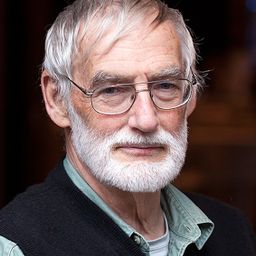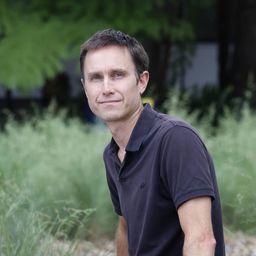
Aurore Grandin
Sessions in which Aurore Grandin participates
Friday 28 May, 2021
Wednesday 2 June, 2021
Sessions in which Aurore Grandin attends
Monday 24 May, 2021
Cognitive science is the interdisciplinary study of mind, embracing psychology, computer modeling, neuroscience, linguistics, anthropology, and philosophy. Its intellectual roots are in the 1950s when cognitive psychology and artificial intelligence began. Its organizational roots are in the 1970s when the term “cognitive science” was introduced and the Cognitive Science Society was formed. Cognitive science combines ideas and methods from multiple fields to address important questions about ...
Over the last several years, there has been an explosion of interest and attention devoted to the problem of Uncertainty Quantification (UQ) in climate science—that is, to giving quantitative estimates of the degree of uncertainty associated with the predictions of global and regional climate models. The technical challenges associated with this project are formidable, and so the statistical community has understandably devoted itself primarily to overcoming them. But even as these technical ...
Tuesday 25 May, 2021
In recent decades, changes in climate have caused tremendous impacts on natural and human systems across the world, with an increase in socio-economic costs from climate-related events. In the future, climate change is also expected to increase the frequency of extreme weather events such as floods, droughts and heat waves, as well as the intensity of hydro-meteorological hazards. The rate of warming will then increase the likelihood of severe and irreversible impacts, especially for the m...
Wednesday 26 May, 2021
In order to win the world war against climate change, one will have to incentivize billions of people andentreprises to implement a myriad of micro- and macro-actions to reduce global emissions. The problem is that these stakeholders will bear 100% of the cost, and basically 0% of the benefits, which will mostlygoes to future generations. This so-called externality and free-rider problems have only one solution which is unanimously supported by economists. They propose to implement the pollut...
Integrating the social sciences into knowledge production about climate change is widely recognized as difficult, for various reasons. But political science presents a particular sort of problem for such integrated knowledge production. When produced for policy-oriented processes, where policy-makers may themselves get to revise and approve the text of a document (as is the case for IPCC reports), knowledge focused on explaining and evaluating the performance of political systems on climate c...
Friday 28 May, 2021
I will examine both the “supply side” and “demand side” of climate denial. On the supply side I will report the evidence for the organized dissemination of disinformation by political operatives and vested interests, and how the media respond to these distortions of the media landscape. On the demand side, I explore the variables that drive people’s rejection of climate science and lead them to accept denialist talking points, with a particular focus on the issue of political symmetry. The ev...
Much like a viral contagion, false information about climate change can spread rapidly from one individual to another. Moreover, once lodged in memory, misinformation is difficult to correct. Inoculation theory, therefore, offers a natural basis for developing a psychological ‘vaccine’ against the spread of fake news and misinformation about climate change. Specifically, in a series of randomized lab and field studies, we show that it is possible to pre-emptively “immunize” people against cli...
Monday 31 May, 2021
Tuesday 1 June, 2021
Audience segmentation in the U.S. and Canada has identified discrete groups with beliefs and values that predispose them to ignore, dispute, or attend closely to information on climate change. Understanding these predispositions allows us to design communications that can reduce the obstacles inhibiting audiences from becoming more engaged with the issue. Audiences that are already concerned about climate change want information on effective solutions and actions they can personally take to r...
This presentation considers the varied ways that one can model and analyze the science-politics communication processwith regard to climate change. The focus is particularly on the following: the ways that politics further confounds existing challenges faced by climate scientists when speaking to those outside of their respective domains; the processes that allow media-based climate science reports to impact public opinion and policy outcomes; and the options wehave to improve how climate sci...
Democracies depend on educated citizens who can make informed decisions about scientific issues. This presentation will focus on how teaching and learning about climate change presents both challenges and opportunities for educators in K-12, higher education and in informal learning environments such as museums. In her forthcoming book, Science Denial: Why It Happens and What To Do About It, Sinatra and co-author Barbara Hofer examine the psychological factors contributing ...
Wednesday 2 June, 2021
In 2008, the authors of a famous Science article proclaimed that climate change had rendered a fundamental societal assumption, that of ecological stationarity, to be “dead.” But adaptation to environmental change is not a new problem for our species. Indeed, some of the defining evolutionary moments of our species may have been times of environmental change. This talk will explore some of the pathways by which humans recognize and act on risks using case examples and other studies o...
A complete policy response to climate change, habitat destruction, plastic pollution, and other Anthropocene challenges requires action by governments, industries, nongovernmental organizations, and individuals. Attempts to drive change at the individual level often confront reactions like “Why should I bother altering my behavior? And if I do change, will my actions make a difference?” In this talk I discuss the drivers and predictors of individuals’ perceptions of the risk of climate change...
Thursday 3 June, 2021
Political organizations across various scales are engaged in addressing climate change through the design of policies (e.g., a carbon tax), plans (e.g., Adaptation Plans) and institutions (e.g., the Green Climate Fund), the development of new technologies (e.g., electric vehicles), the creation of scientific knowledge, or the support of new norms and behaviors (e.g., limiting flying or eating vegetarian). This toolbox for climate governance keeps expanding, but is currently missing an importa...
H. sapiens is a self-described intelligent species, yet seems committed to destroying its own habitat. Human-induced climate change, driven by carbon-dioxide and other GHG emissions, is one of several well-known threats to global civilization. Nevertheless, 34 climate conferences and half a dozen major international agreements in the past 50 years have failed to produce even a ripple in the curve of exponentially increasing atmospheric CO2 concentrations. Climate change is accelerating. This ...
Friday 4 June, 2021
Climate activism is crucial for any sustained progress on climate action. I will discuss this from two systemic perspectives in social science: political economy and science communication. I will explore what the terms "fossil capitalism" and "captured state" mean in reality and for activism, in particular through the lens of the political economy of dependence on cars. I will build on this systemic understanding to draw lessons for the role, potential and necessity of social organizing and a...
What kind of actions are most effective in shifting cultures and systems at the rate, scale, speed, and depth that is called for today? With more and more attention on climate activism, it is worth considering the qualities of agency that are most effective at generating change. In this talk, I will consider the relationship between individual change, collective change and systems change and argue for a “fractal” approach to climate activism. O’Brien, K.,Selboe, E. an...
Climate activism has been hitting the streets since the early 2000s, but has come in notable peaks and troughs. What is it that causes those peaks and troughs? And where might we expect climate activism to go next after the latest wave of civil disobedience? What allowed these new waves of climate activism (Extinction Rebellion and Fridays for Future) to emerge and flourish? The talk will focus mostly on the British case, exploring frictions and factions and undercover policing as demotivatin...
Scholars, journalists, and activists continue to debate the role of emotional messaging in climate change communication. This talk will consider existing theory and research on the role of emotions, especially fear and hope, in public engagement and activism around climate change. Particular attention will be paid to how media, including both news and entertainment, evoke emotions about climate change, with the potential to both activate and alienate publics.Borum Chatto...
Is academic climate advocacy to be celebrated or derided? There are various flavours of climate advocacy and activism among academic researchers. Some facilitate engagement about their research; others abstain under pressure from their scientific peer communities not to over-reach beyond their research specialty. A literature review suggests there are three advocacy approaches: avoidance of all advocacy (Type 0), advocacy for (scientific) evidence (Type I), and advocacy for policy outcomes (T...


































